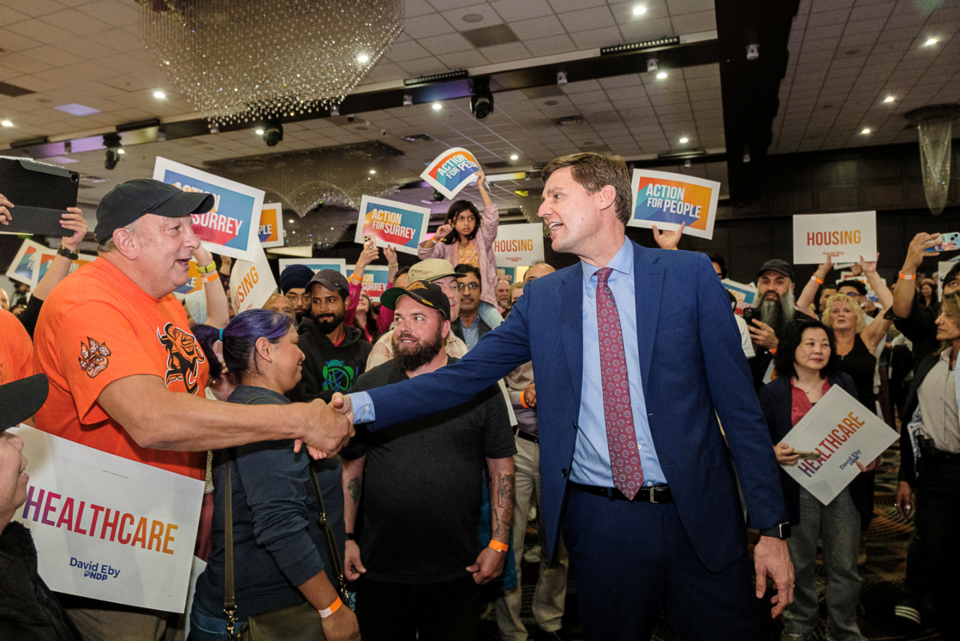BC NDP leader David Eby unveiled a big-time, middle-class tax cut Sunday, to try and staunch the momentum of the rival BC Conservatives, as the election rolls into the second of four weeks.
Both the announcement, and the 1,600-person rally in Surrey where it was unveiled, were intended as shows of strength by New Democrats, who are facing a strong challenge from the Conservatives.
They also give voters a clear choice between the tax relief promised by the “Rustad Rebate” versus the new “Eby-bate.” One is an annual tax write-off that reaches a vast swath of people, the other is a more targeted cut to income taxes on pay cheques.
“We’ve been working on a way to address the concerns people have about the cost of food and the global inflation that’s been hitting them here in British Columbia, and this is a way we can respond to that reality,” Eby said in an interview.
The BC Conservatives scoffed at the announcement.
“David Eby has been in government for seven years,” the party said in a statement.
“Over the course of those seven years he’s had plenty of opportunities to cut taxes for British Columbians. Instead, he chose to raise them, every, single, time. He simply cannot be trusted.”
The “Eby-bate” is a proposed income tax cut, worth as much as $1,000 annually through deductions off every pay cheque.
The “Rustad Rebate” is a proposed tax write-off of up to $3,000 in monthly rent and mortgage costs, which could provide $1,600 in a cash rebate when you file your taxes annually.
The contrast is deliberate, said Eby.
“I liked the income tax cut because it’s immediate, because people see it on their pay cheque,” he said.
“They don’t have to wait for it to the end of the year. They don’t have to pay up front.”
The BC NDP rebate would be income-tested, with the full $500 for single people with a salary up to $100,000 (phasing out at $125,000), and the full $1,000 for households phasing out at $250,000.
To provide “immediate” relief, the NDP are promising to send out the rebates as a cheque in 2025, with the income tax deduction starting in 2026.
The one-time rebate cheque would cost government $1.8 billion, with the annual income tax cut foregoing $1.3 billion in revenue.
Eby said the amounts are affordable. But that’s a tough claim to make for a government on track to run a record $9 billion deficit this fiscal year.
“We’ll be able to show declining deficits and at the same time support people,” said Eby, referencing the yet-unreleased NDP election platform costing. That’ll have to be quite the plan.
Rustad has billed his policy as “one of the most significant tax reliefs that British Columbia has ever given, and certainly the largest tax relief that's ever been given to people who are either renting homes or who are paying their mortgages.”
The BC Conservative plan would cost around $900 million in 2026 in a partial form, and $3.5 billion annually when fully implemented in 2029. The amounts are significant, but a tax cut you can’t even implement fully within your first four-year term of government is a bit of a hard sell to voters struggling right now.
“It requires you to wait until 2029 to enjoy the full benefit,” said Eby. “And people need support right now.”
Right now being the election—and not the previous seven years of BC NDP government when such a rebate could have been unveiled at any time as the affordability crisis worsened.
The BC Conservatives are likely to focus their attack on that very point, portraying the NDP as panicking to buy your vote with your own money, in the face of the very real prospect of defeat.
The NDP, meanwhile, hoping the prospect of $1,000 cheques through the last-minute “Eby-bate” is enough to wipe away any lingering questions about why it wasn’t done much sooner.
Rob Shaw has spent more than 16 years covering B.C. politics, now reporting for CHEK News and writing for Glacier Media. He is the co-author of the national bestselling book A Matter of Confidence, host of the weekly podcast Political Capital, and a regular guest on CBC Radio.




